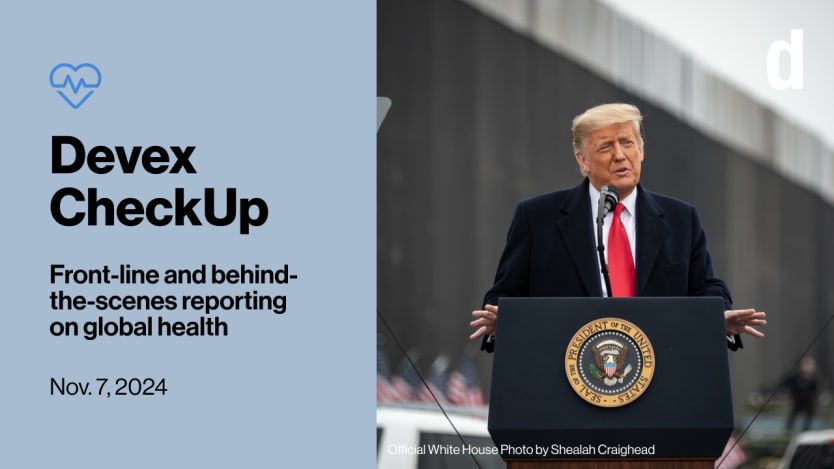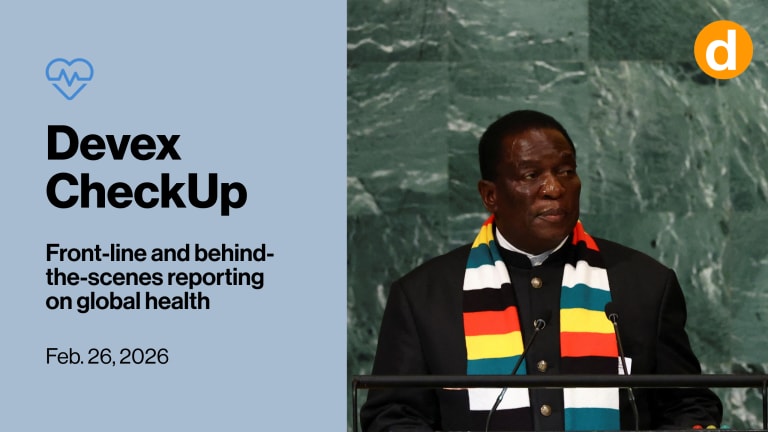
The votes are in, and Donald Trump has won the U.S. election, making him (fun fact!) the second U.S. president to win two nonconsecutive terms. Not-so-fun fact, for most of the people subscribed to this newsletter: The U.S. is the largest donor to global health, and Trump’s imminent return to power is likely to lead to funding cuts and restrictions.
When he was in office, the former president halted funding to and initiated withdrawal from the World Health Organization, a move that he’s “very likely” to repeat, according to Rep. Marjorie Taylor Greene, a Republican from Georgia, who spoke on the matter during a congressional hearing in December 2023.
Abortion rights was a key issue for many Americans in the elections. Trump has taken credit for overturning Roe v Wade, a Supreme Court decision that ensured the right to an abortion, while Vice President Kamala Harris defended abortion rights and made them a key part of her election campaign.
This is a preview of Devex CheckUp
Sign up to this weekly newsletter for exclusive global health news and insider insights in your inbox every Thursday.
But the issue transcends U.S. borders. Experts are almost certain that Trump would again defund the U.N. Population Fund, or UNFPA, which he accused of supporting coercive abortion in China despite a lack of evidence.
Republican presidents, starting with Ronald Reagan, have halted funding to UNFPA. But my colleague Colum Lynch reports that this time, the U.N. agency could lose well over $160 million — more than double the $70 million that UNFPA lost in U.S. funding during Trump’s first term in office.
Trump is also likely to reinstate the global gag rule, which withholds funding to foreign NGOs if they provide any abortion-related activities, even if those services are funded by non-U.S. sources. During his first term, Trump expanded the policy to include all U.S. global health assistance.
Abortion rights groups fear Trump may further expand the policy to include all U.S. development assistance — at a time when anti-choice groups are gaining power and setting up shop abroad to challenge abortion laws and programs that promote comprehensive sexual education as part of sexual and reproductive health rights.
My colleague Michael Igoe reports that a global anti-abortion coalition, which started during Trump’s first administration and has grown since then, is eagerly awaiting his comeback.
Read: Inside the global anti-abortion coalition preparing for Trump’s return
Read more: Will Trump gut UN family planning funds ... again?
+ Trump’s return to the White House raises critical questions about the future of U.S. foreign aid and its influence on global development. Join our conversation next week to discuss the implications. Save your spot now.
Meanwhile, 7,708 miles away
The impact of such funding cuts could mean life and death for many women in places like Nepal, where decades of progress in reducing maternal deaths are at risk of being undone due to a drop in donor funding.
Nepal’s maternal mortality rate has decreased by more than 76% from 1996 to 2021, thanks to government efforts supported by nonprofits and international donors. But as funding dried up and donors’ attention turned elsewhere, progress has stalled.
Your next job?
Investment Associate / Officer — Global Health
Value for Good
Luxembourg | Belgium
Efforts to boost family planning services in the country took a hit in 2016 when Trump became president. International and local nonprofits providing family planning services, including medical abortion consultation, were forced to close some of their services. And while funding came in from other donors, it wasn’t enough to scale programs.
That’s affected not just access to safe abortion services, but other aspects that could help save women’s lives, particularly in remote parts of Nepal.
Usha KC, a staff nurse at the Family Planning Association of Nepal, tells Devex contributor Catherine Davison that in the past two years, she has seen fewer women coming for cervical screening checkups, which is critical for the early detection and prevention of cervical cancer — a disease that kills 1,493 women every year in the South Asian country.
Read: In Nepal, aid cuts and Trump presidency threaten safe abortion gains
House rules
Much of the focus has been on the U.S. presidential election. But the makeup of Congress is also crucial for understanding foreign aid to global health.
Take the President’s Emergency Plan for AIDS Relief, or PEPFAR, the flagship program that has enjoyed bipartisan support for decades. During Trump’s first term, his budget proposals included cuts to the program.
What saved PEPFAR was Congress, which rejected the proposed cuts. But unsupported allegations that the program is being used to fund abortion abroad created uncertainties about its future and led to monthslong negotiations over its reauthorization.
While Congress finally agreed to reauthorize the program in March, it is only for one year instead of the usual five. Experts worry that the controversy will continue over its future reauthorizations, especially with Republicans set to control at least one and possibly both houses of Congress.
Dr. John Nkengasong, who heads PEPFAR, said during Devex World that it’s important not to lose focus on the job at hand: ending HIV and AIDS as a public health threat by 2030.
His greatest worry is that in six years, “we look back and we say, look, we've put in more than $150 billion but we are not successful. What will happen to the international community? They will throw their hands up and say: ‘No we tried, and we just have to live with this.’”
Read: PEPFAR chief calls for an accelerated and sustainable HIV response (Pro)
Read more: How will a shifting US Congress shape foreign aid? (Pro)
Related: Abortion politics cast shadow over PEPFAR reauthorization
+ Not yet a Devex Pro member? Start your 15-day free trial today to access all our expert analyses, insider insights, funding data, exclusive events, and more. Check out all the exclusive content available to you.
More uncertainties
“Concluding these negotiations is a priority for the United States, and we seek to facilitate an effective agreement by year-end, if at all possible.”
— Pamela Hamamoto, U.S. chief negotiator for the pandemic accordThat was the message from the U.S. representative as the Intergovernmental Negotiating Body tasked with drafting and negotiating a pandemic agreement resumed meetings this week.
While Hamamoto didn’t mention the U.S. elections, some experts worry that Trump’s next presidency will lead to a withdrawal of the U.S. from the negotiations.
“It would be a terrible missed opportunity if the INB is unable to reach consensus after three years of hard work. We cannot afford to let this opportunity slip away,” she said.
INB needs to decide by next Monday whether to call for a special session of the World Health Assembly in December to adopt the agreement. This effort is currently supported by African countries, the U.S., and WHO Director-General Tedros Adhanom Ghebreyesus, who urged delegates to conclude the agreement within the year, saying they already have “the ingredients in place to meet your objective.”
“I urge you not to allow the perfect to become the enemy of the good or even the excellent. Our divided world needs hope that despite political and ideological differences between countries, they can still come together to find common solutions to common problems,” he said.
But some cautioned the process should focus on the substance of the agreement, instead of rushing its conclusion. Malaysia, speaking on behalf of a band of member states that have joined forces under the handle Group for Equity, said, “Major improvement is still desperately needed in many areas.”
Read: Donald Trump won. What does that mean for development?
What we’re reading
WHO identifies 17 priority pathogens as top priorities for vaccine development. [UN News]
Sudan rolls out the malaria vaccine for children under 12 months old. [Radio Dabanga]
Israeli strikes have damaged a major hospital in northern Gaza, killing dozens of Palestinians. [Reuters]








